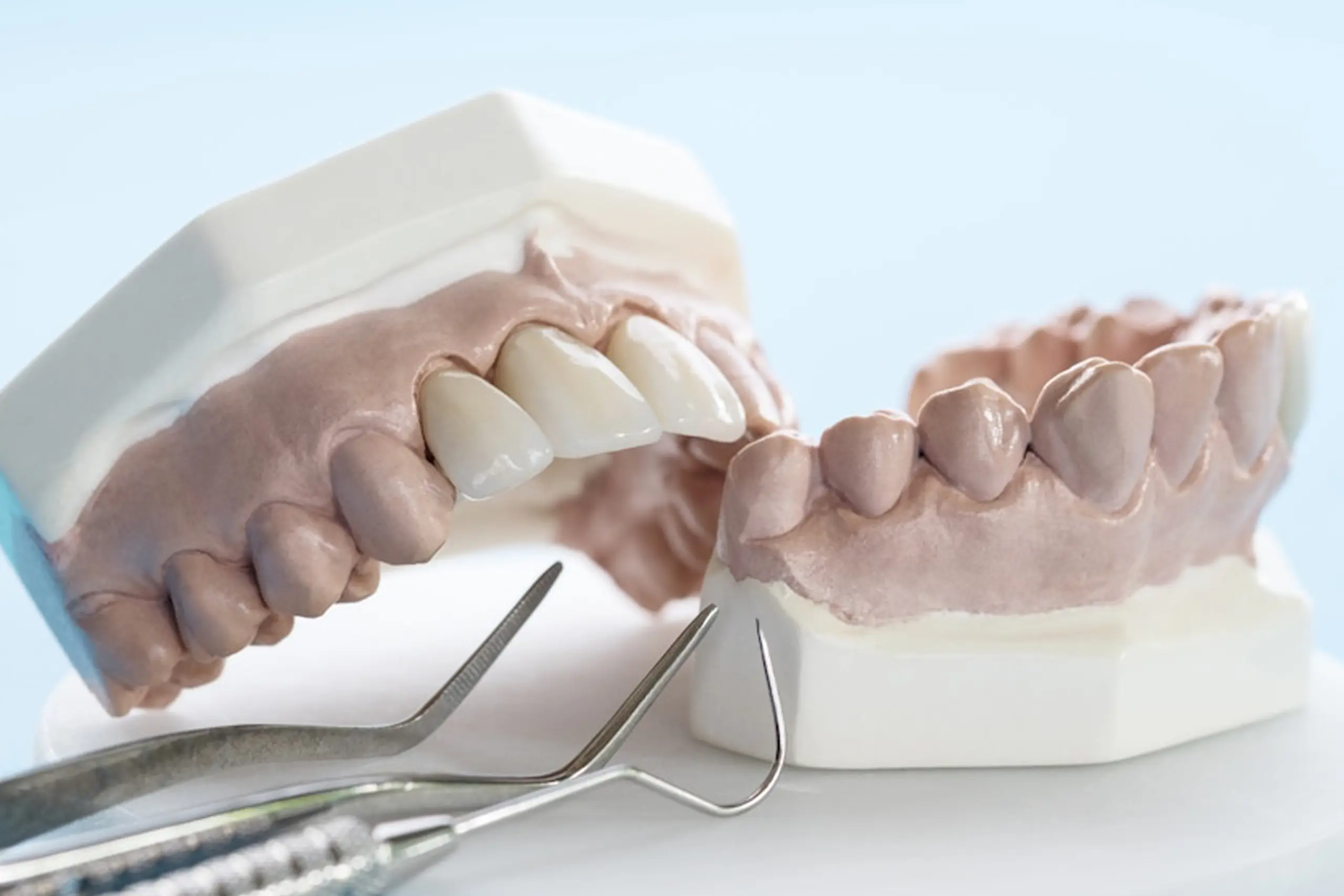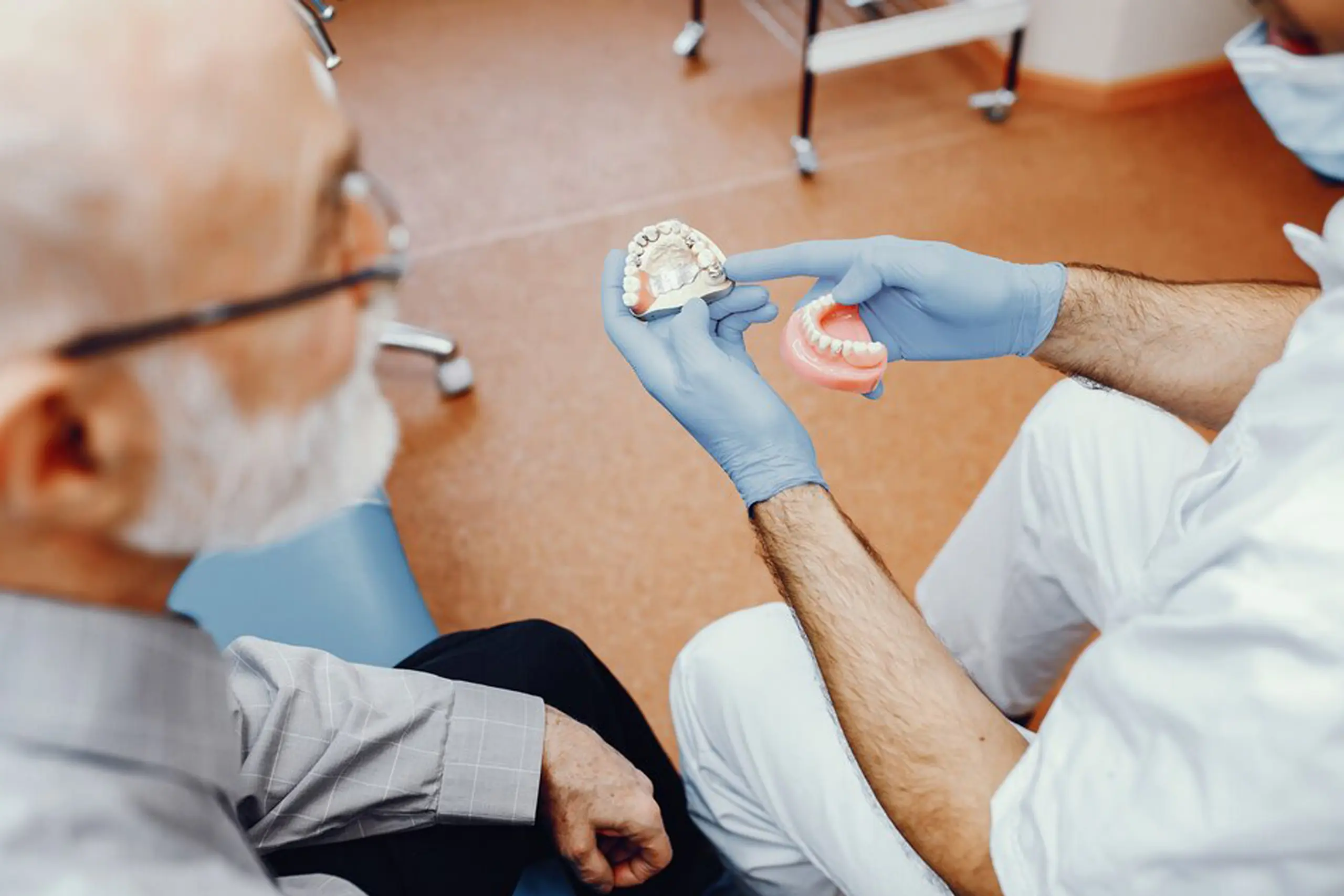dental Prosthesis

Dental prosthesis, commonly referred to as a dental appliance or denture, is a custom-made replacement for missing teeth and surrounding tissues.
These prosthetic devices are designed to restore both the function and appearance of natural teeth, enhancing a person’s ability to bite, chew, speak, and maintain facial aesthetics.
Dental Prosthesis
There are several types of dental prostheses, each catering to specific needs and preferences:
1- Complete Dentures: These are used when all teeth in an arch (upper or lower jaw) are missing. Complete dentures rest on the gums and are typically held in place by suction. They provide functional and aesthetic benefits, improving speech and restoring facial contours.
2- Partial Dentures: Partial dentures are used when some natural teeth remain in the arch. They consist of replacement teeth attached to a metal or acrylic base. Partial dentures can be removable or fixed, depending on the patient’s requirements.
3- Fixed Dental Prostheses: Fixed prostheses include dental crowns, bridges, and implant-supported restorations. Dental crowns are individual caps that cover a damaged tooth, while bridges replace one or more missing teeth by anchoring to adjacent natural teeth. Implant-supported restorations involve attaching prosthetic teeth to dental implants embedded in the jawbone for a stable and permanent solution.
4- Removable Dental Prostheses: Removable prostheses, such as complete and partial dentures, can be taken out and cleaned by the patient. They provide flexibility and convenience, allowing for easy maintenance.
Creation and Fitting
The creation and fitting of dental prostheses require a combination of clinical expertise, dental laboratory skills, and attention to detail. The goal is to provide patients with functional, comfortable, and natural-looking replacements for their missing teeth, ultimately improving their oral health and quality of life.

Benefits
Dental prostheses offer numerous benefits, including improved chewing and speaking abilities, enhanced facial appearance, and the prevention of teeth shifting due to gaps. They contribute to a better quality of life by restoring oral function and confidence.
In summary, dental prostheses are customized replacements for missing teeth, available in various types to suit individual needs. Whether replacing a single tooth or a full set, dental prostheses play a crucial role in restoring oral function, aesthetics, and overall well-being.
Dental Prosthesıs
Before & After
Treatment Stages
Frequently Asked Questions
A dental prosthesis is an artificial replacement for missing teeth or oral structures, designed to restore functionality and aesthetics.
There are several types, including partial dentures, complete dentures, fixed bridges, and implant-supported prostheses.
Dental prostheses may take some time to get used to, but modern designs aim to enhance comfort and fit.
The longevity of dental prostheses varies. With proper care and maintenance, they can last for several years.
Initially, there might be a slight adjustment period affecting speech. Over time, most people adapt and speak comfortably.
Modern dental prostheses are designed to look natural and blend with your remaining teeth, minimizing their visibility.
Cleaning methods vary by type. Typically, they should be removed and cleaned daily using a denture brush and mild cleanser.
Yes, after adjusting, you can enjoy most foods. Initially, stick to softer foods and gradually reintroduce a regular diet.
Dentists generally recommend removing dentures at night to allow the gums to rest and promote oral health.
Regular dental visits are important to assess the fit, ensure oral health, and make any necessary adjustments.
It’s generally recommended to remove dentures during sports to prevent discomfort or injury.
Regular toothpaste can be abrasive, damaging the prosthesis. Use a denture-specific cleaner to prevent scratching.
Yes, dental prostheses can enhance your smile and facial appearance by restoring missing teeth and supporting facial structures.
Properly fitted and maintained prostheses can improve oral health by preventing oral tissue collapse and aiding in chewing.
Dental prostheses are a viable option for many individuals with missing teeth. Consultation with a dentist will determine suitability.
Yes, if you desire a different look or improved fit, you can discuss options with your dentist.
Dental insurance coverage for prostheses varies. Check your policy or discuss coverage with your insurance provider.
Dental prostheses do not respond to teeth whitening treatments. Regular cleaning helps maintain their appearance.
Dental prostheses can help maintain bone structure by preventing bone resorption in areas with missing teeth.
DIY adjustments are not recommended as they can damage the prosthesis or worsen fit. Visit your dentist for proper adjustments.
Patient Registration Form
SmyrnaMED
Rediscover Your Beauty...
If you are looking for a reliable, friendly, and people-centered approach in the field of Aesthetic Plastic Surgery, Dental Treatment and Hair Transplantation, you are in the right place. SmyrnaMED is just a phone call away.
